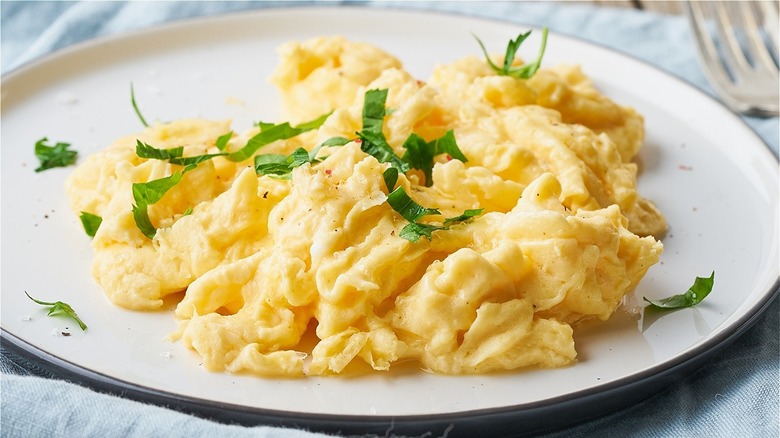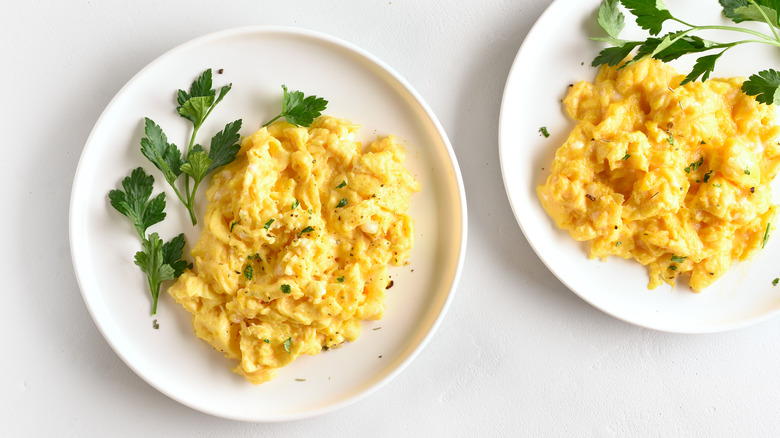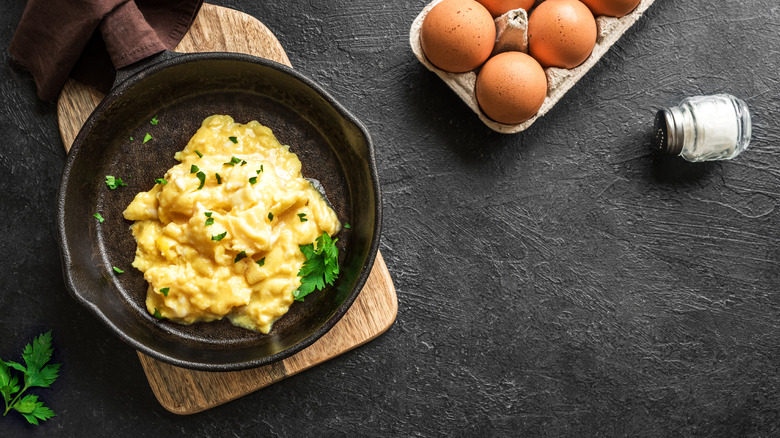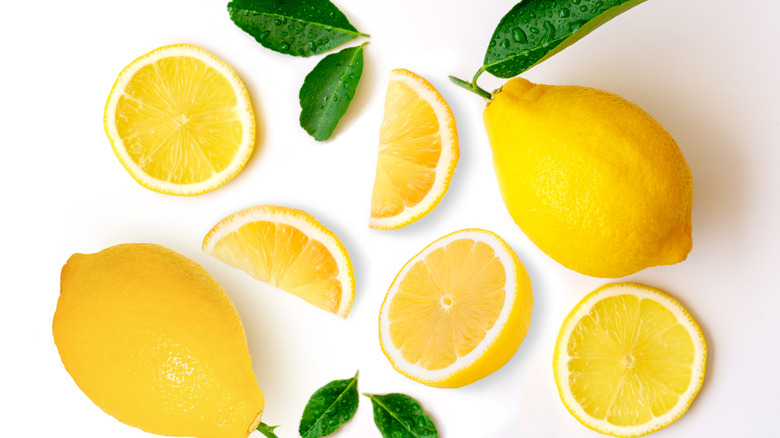How Lemon Juice Can Elevate Your Scrambled Eggs
Scrambled eggs are one of the first dishes that many home cooks learn how to make; they're incredibly simple to whip up. Not to mention, they're endlessly customizable and make the perfect base for whatever you have left over in your fridge: a sprinkle of cheese, a few chopped veggies, some fresh herbs, perhaps a dash of hot sauce — anything that strikes your fancy.
As Bon Appetit outlines, though, even in such a seemingly straightforward dish, there's plenty of room for errors. You might crank the heat up too fast rather than cooking them low and slow as advised, you might use the wrong kind of pan, or perhaps you added way too much milk or cream and got the texture all wrong as a result.
As your culinary skills have advanced over the years, there's a good chance you've played around with different scrambled egg hacks and tricks in the quest for the perfect fluffy-not-flat scrambled eggs, adjusting your go-to recipe for the breakfast staple. However, there's one ingredient that can be a huge game-changer. And, it's one you likely have in your kitchen already.
What lemon juice does to scrambled eggs
Lemon juice may not be the first ingredient that comes to mind when you envision flawless scrambled eggs, but it works for a reason.You might already know that lemon juice adds a touch of bright acidity that can help liven up any dish. But it's not the flavor alone that elevates scrambled eggs — it's how it affects the chemistry of the dish and the cooking process.
As Well + Good explains, adding a small amount of lemon juice as you're whipping the eggs slightly changes the structure of the protein-packed dish. It creates air pockets in the eggs, explains Happy Egg, which helps to yield a more fluffy, cloud-like final product, which is what you want in perfect scrambled eggs. The simple citrus addition also works with the egg proteins and slows down the cooking process, improving the texture of the final product.
While the creamy, fluffy texture is where the lemon juice works its magic, it contributes to the flavor profile as well. As Wonder How To reports, lemon juice causes you to salivate and has a similar impact on your taste buds that salt does, helping enhance the other flavors going on in the dish.
As for the amount needed, while it's ultimately a matter of preference, start with MyRecipes' suggestion of about half a teaspoon for every two to three eggs you're scrambling and then adjust if desired.
Why the hack works
Still not sure exactly how something as simple as a squeeze of lemon juice can impact the overall texture of scrambled eggs? While the citrus works its magic on the proteins in the egg, it's also the simple matter of introducing extra moisture. (There's a reason the recommendation isn't to add lemon zest.) As Well + Good explains, lemon juice contains water, which dilutes the egg proteins and allows them to cook more slowly. As the moisture in the lemon juice evaporates, it creates steam, explains food scientist Makenzie Bryson Jackson. And it's the steam that helps to create that soft, fluffy texture that many prize in their scrambled eggs.
The tip is also useful if you're the type who wants to make scrambled eggs for a crowd in advance. When they're not served fresh off the oven, scrambled eggs can get a gray or green tint to them. You may recognize the hue from when you get that unappealing ring around the yolk of your hard-boiled egg, as the University of Nebraska-Lincoln Institute of Agriculture and Natural Resources writes. The color is because of the same chemical reaction, where the iron in the egg yolks reacts with the hydrogen sulfide in the egg whites to create iron sulfide.
As per Our Everyday Life, adding a bit of lemon juice can neutralize this reaction and leave you with eggs that stay that desired buttery-yellow hue.
Celebs love the citrus and egg combination
Queen Elizabeth II had plenty of rules for the types of foods she would eat — as well as the foods she wouldn't eat and even forbade others in the royal family from consuming. However, her meals weren't always extravaganzas packed with high-end ingredients. Sometimes, she would favor a simple dish such as scrambled eggs — although she preferred hers with a bit of a twist. As Taste of Home notes, the queen's preferred scrambled egg recipe (crafted by her chef, of course) incorporated a generous teaspoon of lemon juice, as well as milk, chives, and nutmeg to get that flawless texture.
You may want to consider the magic of lemon juice with other egg preparations as well. When cookbook author and television personality Nigella Lawson demonstrated how to craft her Turkish poached egg in a BBC clip, she also shared a citrus-based tip. As she explained, when she's poaching eggs, she adds a teaspoon of lemon juice atop the egg white before she scoops it into the poaching water. According to Lawson, a teaspoon or so of lemon juice added in this manner helps the egg hold its shape, which is often a challenge for poached eggs.
You could also use the tip to make picture-perfect eggs Benedict, perfectly poached eggs for avocado toast, or whatever poached egg dish you dream of whipping up at home.



